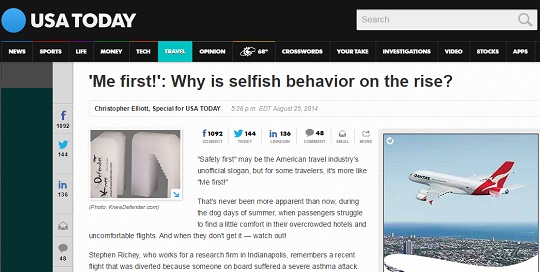By Christopher Elliott August 25, 2014
“Safety first” may be the American travel industry’s unofficial slogan, but for some travelers, it’s more like “Me first!”
That’s never been more apparent than now, during the dog days of summer, when passengers struggle to find a little comfort in their overcrowded hotels and uncomfortable flights. And when they don’t get it — watch out!
Stephen Richey, who works for a research firm in Indianapolis, remembers a recent flight that was diverted because someone on board suffered a severe asthma attack. After making the unexpected landing, an irate passenger made a beeline toward the flight attendants treating the sick passenger and demanded they take off immediately.
“This is ruining my vacation,” screamed the passenger. When she refused to return to her seat, she was expelled from the flight.
“The best part was all of the cheering as she was escorted off, still cursing and resisting, despite being handcuffed after spitting in the face of one of the officers,” remembers Richey.
Experts say the selfish behavior flares up during periods of high anxiety, like summer and during the holidays. But it’s hard to escape the feeling that our “me first!” attitude is gaining traction, and even harder to know who is to blame for it. Is it a travel industry that adds to the stress with surprise fees and unanticipated hassles, or is it customers who set unrealistic expectations?
Elevated stress levels make travelers lapse into “survival” mode, leading to rude or self-centered behavior, says
Erin Olivo, an assistant professor of medical psychology at Columbia University.
“In this state people are highly reactive and self-focused. They are hyper-vigilant about potential threats to their comfort or safety, and they don’t care about anyone else,” she says.
Also, being away from home, outside the influence of friends and family, can give some people permission to engage in “me first” behavior, like pushing to the front of a line or hogging the armrests on a plane, says Michael Brein, a psychologist who specializes in travel.
“It’s like people going wild on spring break,” he says. “Anything goes.”
Just consider two products that address the “me first” problem on a plane.
One is a relatively new gadget called Create-A-Space that makes a portable seat partition. The $40 product, which sets up on your narrow coach-class armrest, promises to help you “feel first class” every time you fly. The other, the Knee Defender, is a $21 wedge that stops the seat in front of you from reclining.
But who’s the villain here? Is it the airline that deprived its customers of a humane amount of room? Is it the oversize passengers who thoughtlessly reclined their seats? Or is it the travelers who are disabling a seat?
The answer should be obvious, unless maybe you work for an airline’s revenue management department.
Of this, travelers are certain: “Me first” attitudes are everywhere today. Kisha Mays was stunned when another passenger interrupted her as she was speaking with a ticket agent at the airport recently. She objected politely. “He proceeded to keep talking to the agent as if he did not hear me,” remembers Mays, a business development consultant based in Los Angeles. Only after Mays sternly insisted that he return to the line did he back off.
“There’s no such a thing as ‘excuse me’ or wait your turn anymore,” she says.
There may be a solution. Sally Rudoy, a psychotherapist based in New York, says the root cause of “me first” is the class system perpetuated by the travel industry, especially airlines. And while creating “haves” and “have-nots” rewards a select few passengers and enriches travel companies, it is, on balance, bad for the rest of us.
“Creating tiers of service for which you can charge premiums — like first class, business class, economy plus, and gold card members — stirs up anxiety about where you (as a) customer rank in the world,” Rudoy says.
There might be something to her theory. Imagine if suddenly all the seats had a little more space, the lines were a little shorter, the fees a little less onerous. Would we still see this display of raw emotion? Unlikely.
It also raises another question: What’s next? If airlines remove another inch of legroom and add another fee, then where does that leave us? That’s a summer sequel no one wants to see.
How to avoid the ‘me first’ crowd
• Stay away from high-stress trips with inexperienced travelers. Travel during off-peak times and avoid busy vacation periods, when anxiety levels run high.
• Avoid problem areas. “Me first” travelers are passengers “with a narcissistic personality, who feel very grandiose, entitled and don’t feel empathy for others,” says Jeff Ball, the executive director of PCH Treatment Centers in West Los Angeles. Take a few steps back and yield to them to avoid a confrontation.
• Steer clear of large groups. “Tour groups, gap-year students and backpackers have this completely annoying tendency of acting like they own a place,” says Rebekah Voss, a travel blogger. Stay away from crowds.
Christopher Elliott is a consumer advocate and editor at large for National Geographic Traveler. Contact him at chris@elliott.org or visit elliott.org.






